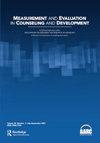Development of the Trauma-Informed Practice Scales – School Counseling Programs Version (TIPS-SCP)
IF 2.2
4区 心理学
Q2 Psychology
Measurement and Evaluation in Counseling and Development
Pub Date : 2023-09-20
DOI:10.1080/07481756.2023.2243263
引用次数: 0
Abstract
AbstractWe evaluated the psychometric properties of the Trauma Informed Practice Scales – School Counseling Programs Version scores using item response theory with a sample of 270 school counselors. Participants ranged in age from 24 to 69 years (M = 42.82, SD = 9.96). Participants identified as female (81.5%), male (14.1%) or unreported (4.4%,). Participants’ racial and ethnic backgrounds were: White (79.3%), African American or Black (5.6%), Multiracial (5.2%), Latino/Hispanic/Spanish (4.8%), American Indian/Alaskan Native (0.4%), Other (0.4%), or unreported (4.4%). Participants from 14 states completed an online survey, which included demographics questions and the TIPS-SCP. After removing the poorly performing items, partial credit model estimates explained 58.63% of the variance in participant responses. We found psychometric evidence to support its ability to capture trauma informed practices in schools and school counseling programs.Significance StatementThe TIPS-SCP is a brief instrument to provide school counselors with a self-assessment of their trauma informed practices. The TIPS-SCP can aid school counselors in making data-informed decisions about immediate and future incorporations of integrating trauma informed practices into their schools and school counseling programs.Keyword: trauma-informed practicestrauma-informed schoolsschool counselorsitem response theoryinstrument development Disclosure StatementNo potential conflict of interest was reported by the author(s).Additional informationFundingThis research was funded by The University of Alabama RGC Small Grant 2019 Area B.Notes on contributorsHeather J. FyeHeather J. Fye, PhD, LPC, NCC, is an Assistant Professor of Counseling at the University of Alabama. Her research interests include wellness, burnout, trauma-informed care, and professional issues of school counseling.Stefanie A. WindStefanie A. Wind is an Associate Professor of Educational Measurement at the University of Alabama. Her research interests include the exploration of methodological issues in educational measurement, with emphases on rating scales, parametric and nonparametric item response theory, and applications of these methods to substantive areas related to education.Ryan M. CookRyan M. Cook, PhD, LPC, ACS, is an Associate Professor of Counseling at the University of Alabama. His research interests include clinical supervision and counselor development.创伤知情实践量表的开发-学校咨询计划版本(TIPS-SCP)
摘要本研究以270名学校心理咨询师为样本,运用项目反应理论评估创伤知情实践量表-学校心理咨询项目版本分数的心理测量特性。参与者年龄从24岁到69岁不等(M = 42.82, SD = 9.96)。参与者被确定为女性(81.5%),男性(14.1%)或未报告(4.4%)。参与者的种族和民族背景为:白人(79.3%),非裔美国人或黑人(5.6%),多种族(5.2%),拉丁裔/西班牙裔/西班牙裔(4.8%),美洲印第安人/阿拉斯加原住民(0.4%),其他(0.4%)或未报告(4.4%)。来自14个州的参与者完成了一项在线调查,其中包括人口统计问题和TIPS-SCP。在去除表现不佳的项目后,部分信用模型估计解释了参与者反应中58.63%的方差。我们发现了心理测量证据来支持它在学校和学校咨询项目中捕捉创伤信息实践的能力。TIPS-SCP是一个简短的工具,为学校辅导员提供创伤知情实践的自我评估。TIPS-SCP可以帮助学校辅导员根据数据做出决定,将创伤知情实践整合到他们的学校和学校咨询项目中。关键词:创伤知情实践创伤知情学校学校辅导员反应理论工具开发披露声明作者未报告潜在利益冲突本研究由阿拉巴马大学研究资助委员会小额资助2019领域b资助。贡献者说明heather J. Fye,博士,LPC, NCC,是阿拉巴马大学心理咨询助理教授。她的研究兴趣包括健康、倦怠、创伤知情护理和学校咨询的专业问题。Stefanie A. WindStefanie A. Wind是阿拉巴马大学教育测量副教授。她的研究兴趣包括探索教育测量的方法问题,重点是评分量表,参数和非参数项目反应理论,以及这些方法在教育相关实质性领域的应用。Ryan M. Cook,博士,LPC, ACS,是阿拉巴马大学心理咨询副教授。他的研究兴趣包括临床监督和辅导员发展。
本文章由计算机程序翻译,如有差异,请以英文原文为准。
求助全文
约1分钟内获得全文
求助全文
来源期刊
CiteScore
2.40
自引率
10.00%
发文量
21
期刊介绍:
Measurement and Evaluation in Counseling and Development is an official journal of the Association of Assessment and Research in Counseling (AARC), a member association and division of the American Counseling Association. Articles range in appeal from those that deal with theoretical and other problems of the measurement specialist to those directed to the administrator, the counselor, or the personnel worker--in schools and colleges, public and private agencies, business, industry, and government. All articles clearly describe implications for the counseling field and for practitioners, educators, administrators, researchers, or students in assessment, measurement, and evaluation.

 求助内容:
求助内容: 应助结果提醒方式:
应助结果提醒方式:


